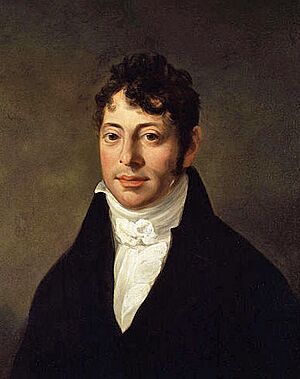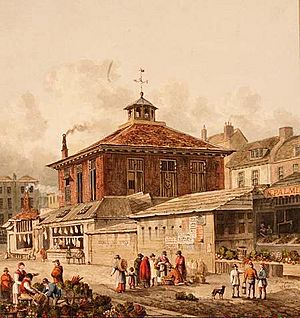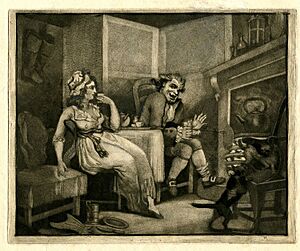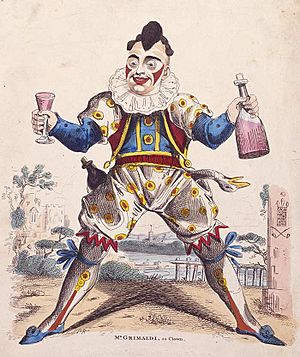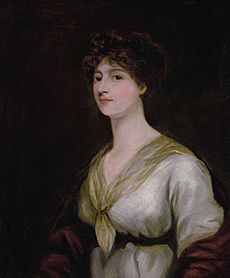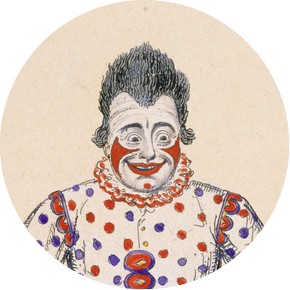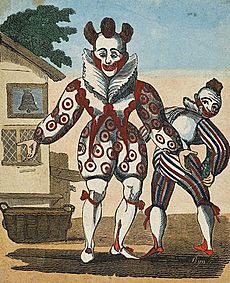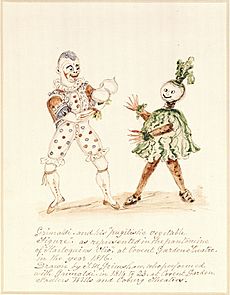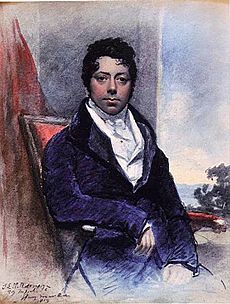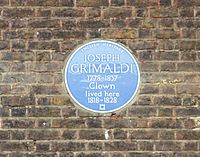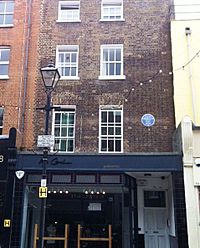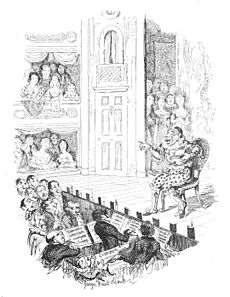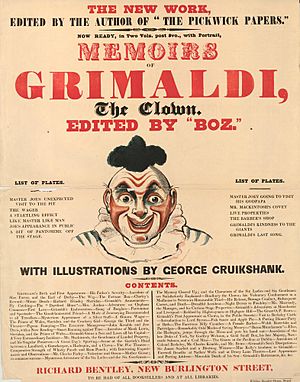Joseph Grimaldi facts for kids
Joseph Grimaldi (born December 18, 1778 – died May 31, 1837) was an English actor, comedian, and dancer. He became the most popular entertainer in England during the Regency era (early 1800s). He greatly changed the role of the Clown in British pantomime shows. He performed at famous theaters like the Theatre Royal, Drury Lane, Sadler's Wells, and Covent Garden.
Grimaldi was so good that the clown role in pantomime became known as "Joey." This nickname, along with Grimaldi's special whiteface makeup, is still used by clowns today. He also created famous phrases like "Here we are again!", which you can still hear in modern pantomimes.
Joseph Grimaldi was born in London. His father was also an entertainer. Joseph started performing as a child, making his first stage appearance in 1780. He became very successful at Sadler's Wells Theatre. His first big role was as Little Clown in a pantomime called The Triumph of Mirth in 1781, where he performed with his father. After a short time at school, he appeared in many shows and became a popular child performer. He had important roles in Valentine and Orson (1794) and The Talisman (1796), which made him even more famous.
By the late 1790s, Grimaldi starred in a pantomime version of Robinson Crusoe, which showed he was a top pantomime performer. Many shows followed, but his time at Drury Lane became difficult, and he left in 1806. He then joined the Covent Garden theatre. Later that year, he appeared in Harlequin and Mother Goose; or, The Golden Egg. This show featured what is perhaps his most famous portrayal of the Clown. Grimaldi worked at both Covent Garden and Sadler's Wells at the same time. He became known as London's best Clown and comic entertainer, with many hits at both theaters. His popularity in London meant that theaters across England wanted him to perform, and he earned a lot of money.
Grimaldi's time at Sadler's Wells ended in 1820 because his relationship with the theater's managers got worse. He had also suffered many injuries over the years from his energetic clowning, and his health was quickly getting worse. He retired in 1823. He appeared on stage sometimes for a few more years, but his performances were limited by his increasing physical problems. In his last years, Grimaldi lived a quiet life. He outlived both his wife and his actor son, Joseph Samuel. He died at home in Islington in 1837, at 58 years old.
Contents
Biography
Early Life and Family History
Joseph Grimaldi was born in Clare Market, a part of Westminster, London. He came from a family of dancers and comic performers. His great-grandfather, John Baptist Grimaldi, was a dentist and performer who moved from Italy to England in the 1730s. He played the role of Pantaloon.
Joseph's father, Joseph Giuseppe Grimaldi (around 1713–1788), was an actor and dancer. He was known as Giuseppe or "the Signor." He came to London around 1760. He performed at the King's Theatre and later became the ballet master at the Theatre Royal, Drury Lane. Grimaldi's mother, Rebecca Brooker, was born in Holborn in 1764. She started training with Giuseppe Grimaldi as a dancer in 1773.
Joseph's father had many children with different women. In 1778, Joseph was born to Rebecca Brooker. Although his father was happy to have a son, he spent little time with Rebecca. Rebecca raised Joseph alone for the first few years in Clare Market, which was a poor area. Around 1780, Rebecca had another son, John Baptiste. Joseph's father wanted his sons to become actors. He moved with Rebecca and his two sons to Little Russell Street. Joseph's father was very strict and would often hit his children if they didn't obey him.
Starting Out at Sadler's Wells and Drury Lane
From the age of two, Joseph Grimaldi was taught by his father how to act the characters in the harlequinade. Both he and his younger brother, John Baptiste, showed acting talent, but Joseph was prepared for the London stage. He made his first stage appearance at the Sadler's Wells Theatre in late 1780. His father brought him on stage for his "first bow and first tumble." In April 1781, Richard Brinsley Sheridan, the manager of Drury Lane, cast both Giuseppe and Joseph in a pantomime. Sheridan hired many children, including Joseph, as extras.
On Boxing Day 1781, Joseph played Little Clown in the pantomime The Triumph of Mirth at Drury Lane. It was a big success for him, and the show ran for a long time. Because of his performance, he got more work and became a regular child performer at Drury Lane. At the same time, he performed a lot at Sadler's Wells, playing small roles like monkeys, imps, and fairies. The Drury Lane season ran from September to late spring, and Sadler's Wells from April to October. Drury Lane attracted wealthy people, while Sadler's Wells was popular with working-class audiences. Even though his acting career was going well, Joseph's father sent him to Mr. Ford's Academy, a boarding school. Joseph found reading and writing hard, but he was good at art.
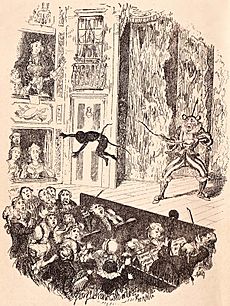
Their success allowed the Grimaldi family to live well, unlike other working-class families. By age six, Joseph was seen as an important performer by the newspapers. One critic said that "the infant son of Grimaldi performs in an astonishing manner." One evening, Joseph was playing a monkey and was led onto the stage by his father, who had a chain attached to Joseph's waist. His father swung him around, and the chain broke, causing young Joseph to fall into the orchestra pit. From 1789, Joseph would perform with his siblings in an act called "The Three Young Grimaldis."
Joseph's father was sick for many years and died in 1788. As a result, at age nine, Joseph became the main person earning money for his family. Sheridan paid him a good wage of £1 a week at Drury Lane and allowed his mother to work there as a dancer. However, Sadler's Wells cut Joseph's pay. The family could no longer afford their house and moved to a poorer area called St. Giles. Joseph's brother, John Baptiste, ran away to sea in 1788 when he was nine. Joseph only saw him once more after that.
John Philip Kemble took over as director at Drury Lane in 1788. Sheridan often gave Joseph small roles in Kemble's shows and let him continue working at Sadler's Wells. Joseph became interested in designing stage scenery. His performances over the next two years were not as successful as before. The main Clown role in London went to Jean-Baptiste Dubois, a talented French performer. Joseph worked as Dubois's assistant.
In 1791, the Drury Lane Theatre was torn down. Joseph performed briefly at the Haymarket Theatre. In April 1794, the new Drury Lane theatre opened, and Joseph, now 15, returned as a main young performer. That same year, he played his first big role since his father's death, as the dwarf in Valentine and Orson. Two years later, at Sadler's Wells, he played Hag Morad in the Christmas pantomime The Talisman. This show was a success, and Joseph received great reviews. The Drury Lane managers wanted to use his success, so he was cast in Lodoiska, a play that needed acrobatic and sword-fighting skills, which he had learned as a child. He gained more fans as Pierrot in the 1796 Christmas pantomime of Robinson Crusoe at Drury Lane.
Grimaldi met Maria Hughes in 1796. She was the daughter of Richard Hughes, the owner of the Sadler's Wells theatre. They married on May 11, 1799. Later that year, Joseph appeared in several shows, playing unusual roles. Despite this, he was praised for his acting and was seen as a legitimate adult actor at Drury Lane.
Later Years at Drury Lane
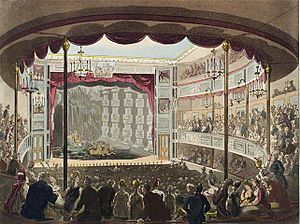
In 1798, Drury Lane stopped its yearly Christmas pantomime. Joseph had to find work elsewhere during the holidays. The next year, he joined the company at Sadler's Wells and performed in several plays. Joseph made a big impression, especially in the Easter 1800 pantomime, Peter Wilkins. For this show, the Clown's costume was changed to be "garishly colourful" with diamonds and circles, instead of the old servant's outfit. This new design was copied by others in London. Joseph's performance seemed more natural than Dubois's, making the audience believe in his comedic qualities more.
At Drury Lane later in 1800, he played an officer, a Jewish pedlar, Clown in Robinson Crusoe, and the Second Gravedigger in Hamlet. Joseph's wife, Maria, and their child died during childbirth on October 18, 1800. To deal with his sadness, Joseph often performed two shows a night. One of Joseph's hobbies was collecting butterflies. In 1800, thieves broke into his home and destroyed most of his collection, so he started raising pigeons instead.
With Christmas approaching, Drury Lane decided to stage a pantomime again, Harlequin Amulet. Joseph played Punch and then Clown, instead of Dubois. In this show, Harlequin became more romantic, leaving Joseph's Clown as the main source of fun. The pantomime was a huge success. Joseph became known as one of London's top Clowns. He created the catchphrase "Here we are again!", which is still used in pantomime. He was also known for "Shall I?", which made the audience shout "Yes!"
Joseph and Dubois performed together again at Sadler's Wells. They had a mock duel where the audience decided who could make the ugliest face. Joseph always won. In the next show, Dubois was given a smaller role, while Joseph played Clown. Joseph accidentally injured himself on stage and had to stay in bed for five weeks. His mother hired a dancer, Mary Bristow, to care for him. They became close and married on December 24, 1801.
After a disagreement with Kemble at Drury Lane, Joseph was fired. He started performing at the nearby Theatre Royal, Covent Garden. He also performed at his father-in-law's theatre in Exeter. Drury Lane's audience numbers dropped without him. Joseph started performing in other towns. His dismissal from Drury Lane didn't last long, and he was back within a few months.
Sadler's Wells reopened in April 1802 after renovations. Joseph returned and played a major role in the Easter pantomime. For this, he designed the look of his famous "Joey" Clown character. He painted his face, neck, and chest white, then added red triangles on his cheeks, thick eyebrows, and large red lips in a mischievous grin. This design is still used by many modern clowns. Later in 1802, Dubois left Sadler's Wells, making Joseph the only resident Clown. Joseph starred in St. George, Champion of England with his friend Jack Bologna. Their on-stage partnership became very popular.
On November 21, 1802, Joseph's wife, Mary, gave birth to their only child, a son named Joseph Samuel, or "JS." Joseph introduced his young son to the theatre world from a young age. Although he wanted his son to follow him on stage, Joseph felt it was more important for him to get an education.
Joseph returned to Drury Lane in late 1802 and starred in Bluebeard and the Christmas pantomime Love and Magic. In 1803, his contract at Sadler's Wells was extended. He played several roles, including Rufo the Robber in Red Riding Hood. The Napoleonic Wars had started, and theaters relied on Joseph to entertain audiences looking for a laugh. Cinderella was presented at Drury Lane in January 1804. Joseph played Pedro, a servant. The show was a big success, but Joseph and critics felt his talents were not being fully used.
The Sadler's Wells season began at Easter 1805, and Joseph and Jack Bologna had a successful period. Drury Lane staged the opera Lodoiska, with Joseph, his mother, and his wife all in starring roles. After this, he was asked to choreograph a play called The Honey Moon. He agreed, but only if his wages were increased for the whole show. Drury Lane agreed, but then cut his wages a few weeks later. Joseph sought advice from Thomas Dibdin, who told him to leave Drury Lane and join the Covent Garden Theatre. Joseph wrote to Thomas Harris, the manager of Covent Garden, hoping he would stage Christmas pantomimes. Harris was already a fan of these shows. Joseph met with Harris and got a contract.
Covent Garden Success
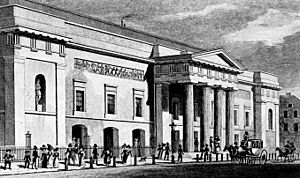
In 1806, Grimaldi bought a second home, a cottage in Finchley, where he rested between seasons. He was hired to perform in Dublin at Astley's Amphitheatre. The theatre needed repairs, so audiences were small. Joseph donated his salary to help pay for the renovations. The company then moved to the Crow Street Theatre for a benefit show to help Astley's. After two more plays, the company returned to London.
Harlequin and the Forty Virgins opened the Easter season at Sadler's Wells and ran all season. Joseph sang "Me and my Neddy," which became very popular. With high hopes, he appeared at the Covent Garden Theatre on October 9, 1806, playing Orson in Valentine and Orson. Joseph felt the role of Orson was the most physically and mentally challenging of his career, but he performed it with energy on tour.
Perhaps the most famous of Grimaldi's pantomimes was Thomas Dibdin's Harlequin and Mother Goose; or, The Golden Egg, which opened on December 29, 1806, at the Covent Garden Theatre. Like in most pantomimes, he played two roles: first as "Bugle," a rich but rude man, and then as Clown after the transformation. Mother Goose was a huge hit in London and made a lot of money. It ran for 111 performances over two years, a record for any London theatre show at the time. Joseph, however, thought his own performance was one of his worst and felt sad. Critics disagreed, saying the show's success was due to Joseph's acting. One critic wrote that they hadn't seen a more appealing pantomime in years. Kemble said Joseph had "proved himself the great master of his art." The show regularly played to full audiences.
In September 1808, a fire at the Covent Garden theatre destroyed much of the Mother Goose scenery. The show moved to the Haymarket Theatre to finish its run. While Kemble and Harris raised money and rebuilt Covent Garden, Joseph performed in Manchester and Liverpool. The Covent Garden theatre reopened in December 1809 with Mother Goose again. To get back the money spent on rebuilding, Kemble raised ticket prices. This caused audiences to protest violently for over two months, and the theatre had to lower prices back. Joseph's shows in 1809–10 included Don Juan, where he played Scaramouche, and Castles in the Air, as Clown. Later in 1810, he performed in Birmingham for a benefit show for his sister-in-law. The next year, Joseph sang "Tippitywitchet" for the first time at Sadler's Wells; it became one of his most popular songs.
By 1812, despite his success, Joseph faced financial difficulties. This was due to his wife's spending and some people cheating him with his earnings. The financial stress made him accept as many provincial shows as he could. That year, he traveled to Cheltenham and performed as Scaramouche again. In nearby Gloucester, he met the poet Lord Byron at a dinner party. Byron was amazed to meet the famous Clown. Joseph returned to London to star as Queen Ronabellyana in the Covent Garden Christmas pantomime, Harlequin and the Red Dwarf. After this, he increasingly played "dame" roles (female characters played by men).
Sadler's Wells opened its season in April 1814 with Joseph appearing in Kaloc; or, The Pirate Slave. That year, he played the main role in Robinson Crusoe at Sadler's Wells, with his young son, JS, making his stage debut as Man Friday. Other pantomimes followed at Sadler's Wells, and he also played Clown in shows at the Surrey Theatre and Covent Garden – a very busy schedule. Later in 1814, he played the main role in Don Juan at Sadler's Wells, with JS as Scaramouche. The ticket sales were very high, which made Joseph believe his son could have his own career. Joseph faced two problems towards the end of the year: he was sick for a few months and learned of the death of his friend and former father-in-law, Richard Hughes, in December. In early 1815, Joseph and his son played father and son Clowns in Harlequin and Fortunio.
During 1815, Joseph's relationship with Thomas Dibdin became difficult. Dibdin, as manager at Sadler's Wells, refused Joseph's request for a month off to tour other theaters. Joseph briefly left Sadler's Wells in 1815 to tour northern theaters. With Jack Bologna, he performed 56 shows and earned much more money than at Sadler's Wells. Dibdin was struggling, and after the tour, Joseph used this to get a better contract. Dibdin agreed to a pay raise but disagreed with Joseph's other demands. He eventually gave the resident Clown position to another performer.
Later Career and Retirement
In 1815, Grimaldi played Clown in Harlequin and the Sylph of the Oak at Covent Garden, followed by the Christmas pantomime Robinson Crusoe, where he played Friday. Joseph went on a profitable but tiring tour to Scotland, Manchester, and Liverpool in 1818. He suffered bruises and strains from two falls, one of which left him unable to walk for a short time. He and Mary moved to 56 Exmouth Market, Islington, where he recovered before touring with his son.
At Easter 1819, in The Talking Bird, he introduced his famous song "Hot Codlins." Songs about different trades were popular on stage in the 1800s. Joseph found inspiration for the apple seller character by watching real street vendors in London.
Despite another performer's success at Sadler's Wells, Richard Hughes's widow, Lucy, who owned a large part of the theatre, asked Joseph to return. He agreed, but only if he was sold a share in the theatre, remained the resident Clown, and received a higher salary. She agreed, and he played Grimaldicat in the 1818 Easter pantomime The Marquis De Carabas. The show was a disaster and closed after one night. Joseph was booed off stage after an unplanned joke upset the audience. He later felt this was the start of his career's decline. Joseph's first time as a theatre owner was also a failure. The stress of managing the theatre made his health, which was already declining, get worse.
The shares in Sadler's Wells were sold. Joseph's share went to Daniel Egerton. Egerton wanted to keep Joseph on the payroll but suggested lending him to other theaters. Joseph refused these terms and instead performed with JS in Ireland. During the Easter season of 1820, Joseph appeared at the Theatre Royal, Covent Garden, in Harlequin and Cinderella. Joseph played the wife of the main character, Baron Pomposini; this was likely an early example of a pantomime dame. In late 1820, Joseph's health worsened. He suffered frequent emotional breakdowns, stomach pains, breathlessness, and severe joint pain. These problems did not stop his desire to perform. That September, he appeared at Covent Garden in Aladdin and then the successful Christmas pantomime Harlequin and Friar Bacon.
In May 1821, Joseph collapsed after a performance. Doctors said he was suffering from "premature old age." JS took over his father's role and finished the show's run. JS became an official understudy and filled many of his father's other theatre jobs. In the early 1820s, Joseph made a short recovery and had a six-week job at the Coburg Theatre. He appeared as Clown in Salmagundi and Disputes in China. Both shows were successful, but Joseph became ill halfway through the second show's run.
In 1822, Joseph traveled to Cheltenham, in poor health, to perform as Clown in Harlequin and the Ogress. Even though rehearsals were cut short due to his health, critics praised his performances.
Final Years and Death
Grimaldi retired from the stage in 1823 because of his poor health. Years of extreme physical effort from his clowning had damaged his joints, and he had a breathing problem that often left him breathless.
Although officially retired, Joseph still received half of his small salary from Drury Lane until 1824. Soon after this payment stopped, Joseph became poor due to some bad business decisions and because people he trusted with his earnings cheated him. Despite his health problems, he offered to perform small roles in Christmas pantomimes. In 1827, he briefly returned to Sadler's Wells with Bologna, where he taught acting to the mime artist William Payne. He also started working for Richard Brinsley Peake at the English Opera House. Peake hired Joseph to star in Monkey Island with his son JS. However, Joseph's health got worse, and he had to quit before the show opened. The early end to his career, money worries, and uncertainty about his son's future made him increasingly sad. To make light of it, he often joked: "I make you laugh at night but am Grim-all-day." In 1828, two "farewell" benefit performances were held for him. In the first, he appeared at Sadler's Wells to an audience of 2,000 people. Unable to stand for long, he sang a duet with JS and ended the evening with a scene from Mother Goose. His last farewell performance was on June 27, 1828, at Drury Lane. Between 1828 and 1836, Joseph relied on charity benefits to replace his lost income.
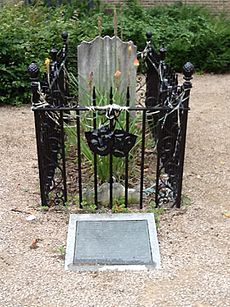
The relationship between Joseph and his son became difficult in the early 1820s. JS, who tried to copy his father's act, received good reviews as Clown, but his success was always compared to his father's. He became unhappy with his father and tried to avoid him. In 1823, he became separated from his parents, seeing them only sometimes over the next four years. They communicated only through letters, with Joseph often asking his son for money. JS once replied, "At present I am in difficulties; but as long as I have a shilling you shall have half." However, there is no record of him ever sending money to his father. JS finally returned home in 1827, when the Grimaldis found their son standing in the street, unwell.
After appearing in a few Christmas pantomimes and benefit shows for his father, JS became unemployed and faced financial troubles. In 1832, Joseph, Mary, and their son moved to Woolwich. JS moved out later that year and died at his home on December 11, 1832, at age 30.
Mary died in 1834, and Joseph moved to 33 Southampton Street, Islington, where he spent his last few years alone. On May 31, 1837, he felt a tightness in his chest but recovered enough to go to his local pub, The Marquis of Cornwallis. He had a fun evening entertaining others. He returned home that evening and was found dead in bed by his housekeeper the next morning. Joseph Grimaldi was buried in St. James's Churchyard, Pentonville, on June 5, 1837. The burial site and the area around it were later named Joseph Grimaldi Park.
Legacy and Impact
After Grimaldi's death, Charles Dickens was asked to edit and improve a book about Grimaldi's life, which was based on the clown's own notes. Dickens did this under his pen name, "Boz." As a child, Dickens had seen Grimaldi perform. The Memoirs of Joseph Grimaldi, with drawings by George Cruikshank, sold very well, to Dickens's surprise.
Grimaldi became famous mainly because of his many successful performances as Clown in pantomimes. His Clown made fun of many parts of British life at the time, especially silly fashions. Grimaldi quickly became the most famous Clown in London. He changed the Clown character from a clumsy country person into the most important character in the harlequinade, even more important than Harlequin. He made the Clown role include many different funny impressions, like a rival suitor or a household cook. Grimaldi's popularity changed the whole show, so the serious first part of the pantomime became just a way to set up the characters for the funny harlequinade. He was so important that later Clowns were called "Joey," and this term, along with his makeup design, was used for other types of clowns. Literary critic John Carey wrote: "He invented clown make-up as we know it today (the wide grin was designed to be visible from the back of Drury Lane's auditorium, the biggest in Europe). He also created the stereotype of the "sad clown," taken up by later funsters including Charlie Chaplin and Peter Sellers."
A writer in 1846 said: "To those who never saw him, description is useless; to those who have, no praise comes up to their appreciation of him. We therefore shake our heads and say 'Ah! You should have seen Grimaldi!'" Another writer said his performances were so good because he observed society's weaknesses and silly things. He was a great comedian who made people laugh until they cried. The British writer James Planché worried that Grimaldi's death meant the end of a type of show.
Grimaldi became "easily the most popular English entertainer of his day." The Victoria and Albert Museum and actor Simon Callow have both said that no other Clown reached Grimaldi's level of fame. Richard Findlater, who wrote a book about Grimaldi, said: "Here is Joey the Clown, the first of 10,000 Joeys who took their name from him; here is the genius of English fun... during his lifetime [Grimaldi] was generally acclaimed as the funniest and best-loved man in the British theatre." Another writer, Andrew McConnell Stott, wrote that "Joey had been the first great experiment in comic persona, and by shifting the emphasis of clowning from tricks and pratfalls to characterisation, satire and a full sense of personhood, he had established himself as the spiritual father of all those later comedians whose humour stems first and foremost from a strong sense of identity."
Grimaldi is remembered today with an annual memorial service on the first Sunday in February at Holy Trinity Church in Hackney. This service, held since the 1940s, attracts hundreds of clown performers from all over the world who attend in full clown costume. In 2010, a coffin-shaped musical memorial dedicated to Grimaldi, made of musical floor tiles, was placed in Joseph Grimaldi Park. The bronze tiles are tuned so that when danced upon, you can play "Hot Codlins." A 2017 film, Grimaldi: The Funniest Man in the World, is about Grimaldi's life.
See also
 In Spanish: Joseph Grimaldi para niños
In Spanish: Joseph Grimaldi para niños


